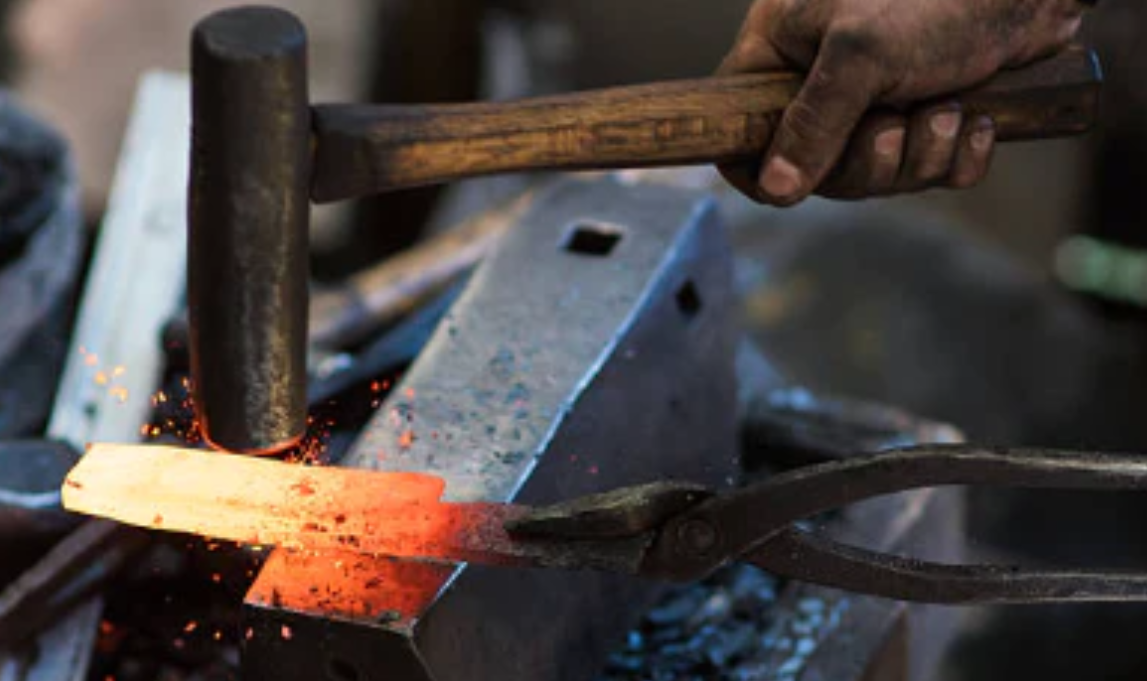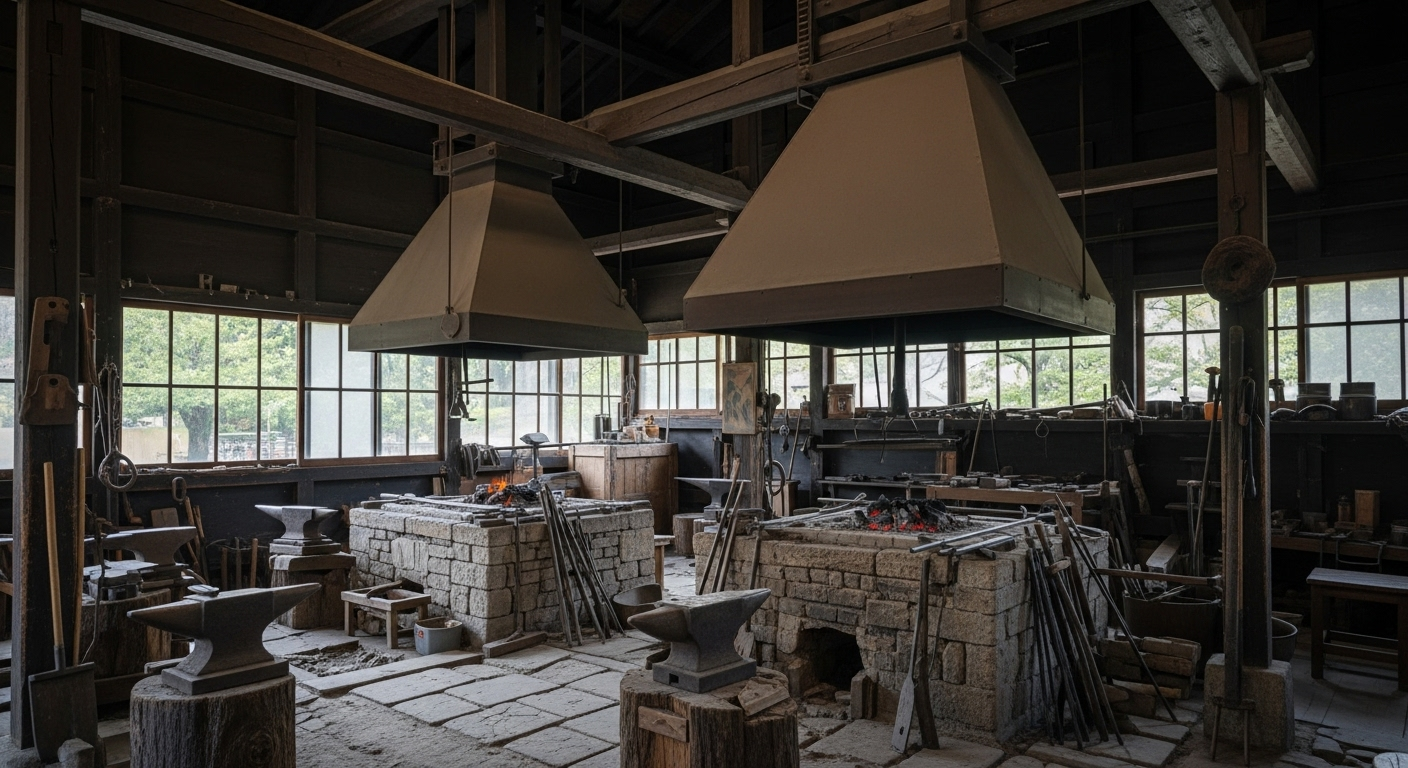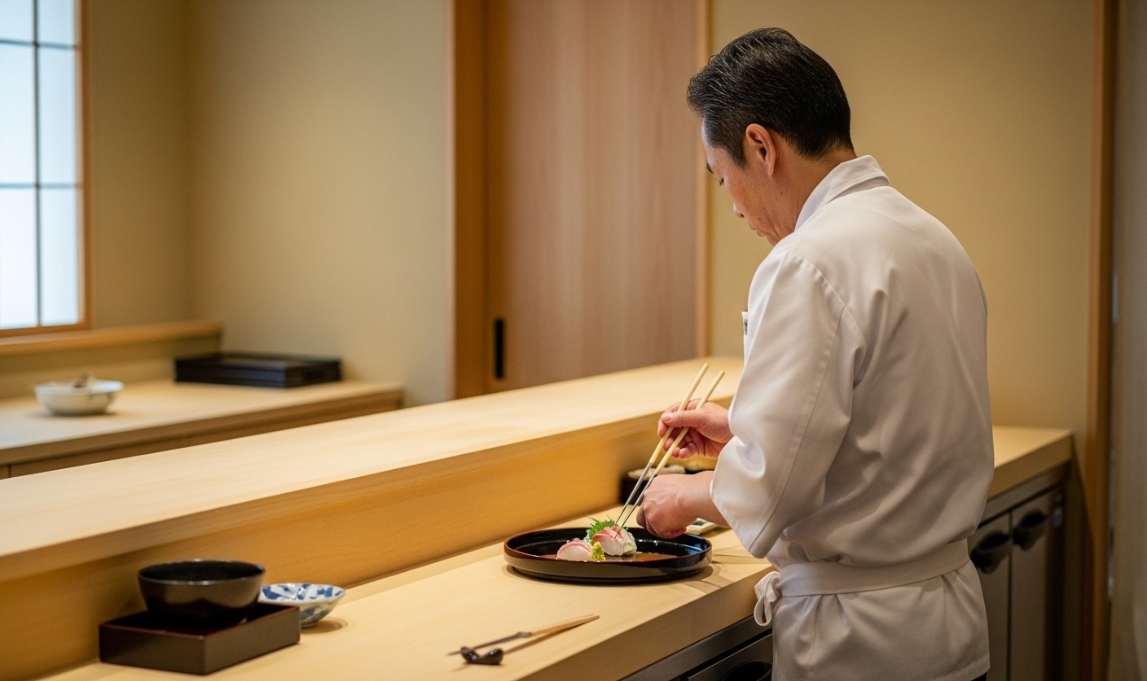
Japanese Knife Care
-
Three Habits That Protect: Wash, Dry, Store
A Japanese knife is sharp, beautiful, and refined — but also delicate. Its true value is revealed not during cooking, but in the care you give it afterward. With just three simple habits — Wash, Dry, and Store — you can preserve its edge, protect its beauty, and make it a lifelong companion.
-
-
A Knife’s Real Worth Emerges After Use
A Japanese knife is a curious tool.
At first glance, it might look like just another kitchen knife. But once you begin using it, you may feel as if the knife is quietly observing you—testing your care, your discipline, and your spirit.In truth, the sharpness and beauty of a Japanese knife aren't maintained while you’re using it—they’re preserved in the moments after you’ve set it down.
No matter how fine the steel or how skilled the blacksmith, a knife will lose its edge and begin to rust if it isn’t cared for properly after use. This is especially true of carbon steel knives, which are extremely sensitive to moisture, salt, and acids. Leave one slightly damp overnight, and by morning, you might find a film of rust.
But don’t worry.
You don’t need expensive tools or special training.
What you need are just three simple habits: Wash, Dry, and Store.These aren't just maintenance routines—they're also part of the graceful etiquette found in traditional Japanese kitchens. And they’re the key to forming a deeper bond with your knife.
-
Step 1: Why Washing Gently Matters Most
After cooking, your knife is covered in oil, salt, and water—all elements that lead to corrosion. That’s why it’s essential to wash your knife as soon as possible.
Use lukewarm water, a bit of mild dish soap, and your hands or a soft sponge.
Never use steel wool or abrasive cleansers, as they can scratch the blade and accelerate wear.Lukewarm water is ideal—it evaporates quickly and leads smoothly into the next step: drying.
☓ Do NOT use a dishwasher.
High heat and water pressure can chip the edge and deform wooden handles. Japanese knife handles, often made from natural wood, are especially vulnerable to heat.☓ Avoid bleach and harsh chemical detergents.
Even stainless steel can rust when exposed to strong cleaners. For carbon steel, it’s even worse. -

Step 2: Drying Is More Important Than You Think
Moisture is the number one enemy of all knives.
Even stainless steel is not truly rust-proof. All steel contains iron, and all iron rusts.So the rule is simple: "If you wash it, dry it immediately."
Use a highly absorbent cloth or paper towel to wipe the blade from tip to handle, paying special attention to the joint where moisture tends to collect.The residual warmth from lukewarm washing helps the knife dry more quickly—a small but helpful detail.
☓ Do NOT air-dry.
Resting your knife in a dish rack risks chipping the edge and traps moisture, encouraging rust.☓ Do NOT use open flames or a hot stove to dry.
Excess heat can ruin the temper of the steel, permanently affecting performance. -

Step 3: How You Store It Makes All the Difference
Once your knife is clean and dry, the next question is how—and where—you store it.
Ideally, use a wooden knife block or sheath.
Avoid storing the blade uncovered in a drawer, where it could get chipped or cause injury. Also, be cautious of humid environments that can promote rust.Some people apply a light coat of oil—camellia or olive oil—before storing, especially for long-term storage. This is a time-honored tradition passed down by generations of Japanese blacksmiths.
-
A Japanese Knife Begins After the Cooking Ends
A knife is a tool for preparing food.
But a Japanese knife is more than that.
It represents respect for ingredients, refinement of taste, and at times, it even serves as a mirror reflecting the cook’s way of life.When I was young, apprenticing under a sushi chef, I saw this firsthand.
After the last customer left, my mentor would wash, dry, and lightly hone his knives with extraordinary care.One night he told me:
“Knives aren’t for display. But if you want to know a chef’s heart, just look at the condition of their blades.”
I’ve never forgotten those words.
What may seem like a tedious routine is, in fact, a quiet ritual where the relationship between you and your craft is strengthened.
-

A Deeper Connection Through Daily Care
Even the best knife reveals its true value only when it’s loved beyond its function.
How you care for your knife after cooking—
That’s what preserves its edge, elevates your dishes, and adds quiet meaning to your everyday life.So next time you finish preparing a meal, take just a moment more.
You’re not just caring for a tool.
You’re honoring your craft, your ingredients—and yourself.
The Quiet Rituals That Keep a Japanese Knife Alive for Life
-

A Japanese knife endures not through skill, but through simple daily habits.
Wash gently, dry completely, and store with care—these quiet routines protect the blade’s edge, reflect your discipline, and keep the knife alive for a lifetime. -

Ⅰ. What Determines the Lifespan of a Knife?
-
A knife’s lifespan isn’t measured in years, but in how long it can still hold an edge. Once the steel has worn away and the blade can no longer be sharpened, its life is over. And because not all knives are built the same, their longevity can differ dramatically.
-
How Construction Shapes Longevity
There are two main styles of Japanese knife construction:
-

1. Zenkou (All Steel) / Honyaki
Forged entirely from steel, these knives can be sharpened again and again as long as steel remains. In the case of Honyaki, however, the lower half is tempered softer, so it cannot be sharpened down completely.
-
2. Kasumi (Steel + Other Materials)
Kasumi knives combine hard steel with soft iron or stainless. Within Kasumi, there are two common types:
-
- Three-Layer Kasumi (Hari Awase ①): The steel core runs through the full height of the blade, including the spine, giving the knife a long sharpening life.
- Inserted Steel Kasumi (Hari Awase ②): The steel core only reaches partway down the blade. Once you sharpen beyond that layer, the edge disappears — and so does the knife’s function. These knives have a shorter lifespan.
-
Can a Knife Last a Lifetime?
It’s often said that “a good knife will last forever if you keep sharpening it.” In reality, a knife’s construction sets its limits. Many widely sold knives overseas are of the Inserted Steel Kasumi type. If you assume they will last forever, you may one day find — suddenly — that the edge is gone for good.
-
Choosing Wisely
The true question to ask is: “How much steel is inside the blade?”
Understanding this will help you choose a knife that doesn’t just perform beautifully today, but continues to serve you faithfully for many years to come.
Ⅱ. Knife Memorial Service: Honoring Tools, Craftsmanship, and Gratitude
-
In Japan, even the humblest tool can carry a spirit. A knife, used daily in the kitchen, holds not only the steel forged by an artisan but also the memories of countless meals and the care of its owner. When its blade finally reaches the end of its life, it is not simply discarded — it is honored.
-
The Meaning of the Knife Memorial Service
Known as Hocho Kuyō, the knife memorial service is a ritual of gratitude. It reflects the belief that cherished objects acquire a soul. By offering thanks to a worn-out knife, people acknowledge both the craftsmanship that created it and the devotion with which it was used.
-
November 8 — Knife Day
Each year on November 8, Japan celebrates Knife Day. The numbers “11” (ii, meaning good) and “8” (ha, meaning blade) form a playful word association. On this day, memorial services and festivals are held across Japan in knife-making towns like Sakai, Seki, and Sanjo. Knives from households nationwide are brought to shrines, where they are respectfully laid to rest — not as waste, but as honored companions.
-

More Than a Ritual — A Cultural Lesson
The knife memorial service embodies Japan’s culture of treasuring objects. It reminds us that tools are more than material goods: they are vessels of history, care, and skill. Honoring them is also a way of honoring the craftsmen who forged them and the families who relied on them.
-
In a world quick to throw things away, this ritual teaches us to pause, to value what we use, and to recognize the quiet bond between human and tool. To honor a knife is to honor the spirit of craftsmanship itself — a tradition that ensures respect and gratitude are passed on to future generations.
Why Japan Honors Its Knives
-

In Japan, a knife is more than a tool—it is a partner shaped by years of shared work. When a blade reaches the end of its life, it is not discarded but thanked for its service. This belief that long-used tools carry a spirit reflects a deep cultural respect for craftsmanship and for the hands that forged the blade. Hocho Kuyō, the annual memorial ritual, reminds us that skill grows through gratitude, and that every knife deserves appreciation for the meals and memories it has helped create.
-
Ⅲ. Can Knife Care Really Deepen Your Connection to Cooking?
-
When Cooking Becomes a Dialogue
An American chef once told me after six months with a Japanese knife:
"I used to feel like I was just processing food. Now, it feels like I’m having a conversation with it."The surprising catalyst wasn’t a new recipe or technique. It was knife care — the simple routines of washing, drying, storing, and sharpening.
-
Care as Relationship, Not Burden
Yes, maintaining a knife takes effort. After a long day, it’s tempting to skip it.
But in those extra moments — rinsing the blade gently, drying it with care, pausing to appreciate its work — cooking begins to feel different.
It shifts from task to relationship. -
A Knife Reflects Its Owner
A well-cared-for knife cuts gracefully, inspiring clean, elegant movements. A neglected knife dulls not only in edge, but in spirit — and your cooking shows it.
A sushi master once told me:
“If you want to know a chef’s heart, look at their knife.”
The longer I cook, the more I understand those words. -

Why Knife Care Is a Form of Love
On the surface, a knife is just a tool.
But a Japanese knife invites something more: attention, respect, and gratitude.
In return, it changes the cook. Care deepens connection. Sharpening the blade sharpens the self. -
A Quiet Ritual, A Pause in the Day
In a fast-paced world, knife care becomes a moment of stillness — a pause button.
A time to breathe, reset, and reconnect with why we cook. -

In Summary: Growth Through Care
Improvement in cooking isn’t always found in new techniques. Sometimes, it lies in how you care for the tools in your hands.
In caring for your knife, you may discover not just sharper cuts, but a sharper sense of yourself.
The Soul of the Blade: How Knife Care Sharpens the Cook
-

Knife care is more than maintenance—it is a relationship.
Your blade reflects your spirit, and caring for it invites a deeper connection with food.
In the quiet ritual of care, sharpening the blade becomes a way to sharpen yourself. -


How You Treat Your Knife Defines You as a Professional
A knife reflects the mindset of the person who uses it.
Through cleanliness, care, and daily habits, this article explores why respecting your knife is inseparable from professionalism, responsibility, and personal growth—whether you are a beginner or a seasoned chef.
FAQ About Daily Care of Japanese Knives

Q1. How do I properly clean a Japanese knife after each use?
Always wash your knife immediately after use with lukewarm water, mild dish soap, and a soft sponge or your hands. Avoid steel wool or abrasive pads, as they can scratch the surface and damage the edge. Never use a dishwasher—the heat, pressure, and detergents can cause chipping and may warp or crack wooden handles, which are often made from natural materials and not dishwasher-safe.
Q2. Why can’t I leave my knife to air-dry?
Air-drying often leaves moisture on the blade or near the handle, creating a risk of rust—even on stainless steel. In addition, placing a knife in a dish rack can dull or chip the edge when it contacts other utensils. Instead, dry the knife immediately after washing with a clean, absorbent cloth or paper towel.
Q3. How often should I sharpen my Japanese knife?
The frequency depends on how much you cook. Home cooks usually benefit from sharpening every 1–3 months, while professional chefs often sharpen weekly or even daily as needed. Always use a whetstone for the best results, and sharpen before the knife becomes completely dull—regular maintenance makes it easier to keep the edge consistent and sharp.
Q4. Can I store my knife in a regular drawer?
It’s possible, but not recommended. Storing knives loose in a drawer risks chipping the edge, accidental cuts, and exposure to moisture. If you must store in a drawer, always use a blade guard or a wooden saya (sheath).
Q5. What’s the safest way to clean a knife without cutting myself?
Always scrub from the spine (back of the blade) toward the edge, never along the edge itself. Hold the handle firmly and clean slowly—there is no need to rush. A sponge provides better control than a cloth, and when rinsing, always point the blade away from your body. Careful habits make knife cleaning both safe and reassuring.
Q6. Where should I store my knife for long-term safety?
The best long-term storage options are a wooden saya, a knife block, or a magnetic strip that keeps blades separated. Always ensure the knife is completely dry before storing. For carbon steel knives, applying a light coat of protective oil helps prevent rust during extended storage.

The Soul of Craftsmanship
-
The Key to Making Your Knife Last – “Don’t Force It”
The golden rule of using a knife is simple: “Don’t force it.” This principle is essential to minimize strain on your blade. Once the knife enters the food, moving it vertically is fine—but avoid twisting, prying, or forcing horizontal motions. Such movements can easily damage the blade, especially with high-quality knives that are made to be thin, sharp, and precise.
-
A finely crafted knife is designed to do the work for you. By respecting its edge and letting its sharpness guide the cut, you not only protect the blade but also ensure smoother, cleaner results. Treat your knife with care, and it will serve you faithfully for generations.
-
The Secret to Long-Lasting Steel Knives: Quick Care
For steel knives, longevity lies in a simple ritual: “Wash it quickly, dry it quickly.” After each use, rinse the blade immediately and wipe it dry with a soft cloth. This prevents rust, preserves sharpness, and keeps the steel alive.
-
High-carbon steel knives, in particular, are more sensitive to moisture than stainless steel. But with proper care, they reward you with unrivaled sharpness and enduring performance. A well-maintained knife becomes more than a tool—it becomes a trusted companion, carrying with it both tradition and your own story of use.
After-Sales Service
-
A knife is more than a tool — it’s a lifelong partner in your kitchen.
At KIREAJI, we stand behind every blade we craft. That’s why we offer dedicated after-sales service to ensure your knife stays sharp, strong, and beautiful for years to come.
Whether it’s routine maintenance or expert repair, your knife returns to the same hands that forged it — the master artisans at Shiroyama Knife Workshop in Sakai, Japan.
Because true craftsmanship doesn’t end at the sale — it continues, as part of your culinary journey. -










